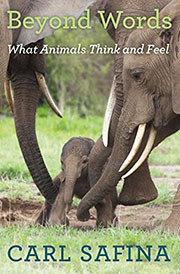There are many of us who write stories with animals as their chief protagonist. I’ve just published Old Wolf, and there are novels like The Good Dog, and the Poppy books. All of these books, and others by other writers (like my favorite, The Wind in the Willows) are anthropomorphic stories, with a variety of animals as conscious, talking creatures, often interacting with humans. Indeed, animal stories (with a few exceptions) are thought of as often exclusively in the domain for young people.
But …
 I have just read a remarkable book: Beyond Words: What Animals Think and Feel, [Holt, 2015] by the scientist Carl Safina. He asks not, “How are animals like humans?” but rather, “How are humans like animals?”
I have just read a remarkable book: Beyond Words: What Animals Think and Feel, [Holt, 2015] by the scientist Carl Safina. He asks not, “How are animals like humans?” but rather, “How are humans like animals?”
The scientific evidence and stories he presents are both fascinating and moving, and even as his research changed his way of thinking, I promise it will change your way of thinking. The work is also sad, and disturbing, in terms of the way humans treat other animals. It becomes clear that in many respects humans are not at the highest level of … well, humanity.
It should be also noted that the book is wonderfully readable.
But what has this to do with books for kids?
What Safina has to say about animals, I suspect, is something young people instinctively know, that they come to think of other non-human creatures as lessor beings only by being taught so, even as they are taught racism or sexism.
In short, all those animal stories for kids have been getting it right. We adults might do a good thing by rereading those books and relearning what we have forgotten.
2 thoughts on “Animal stories”
Oh, Avi, I have always had a passionately strong affinity for animals. I have never thought of them as less.I know they feel as we do. I know they often act in brilliant ways, sometimes much wiser than humans. I brought the book from the library, but had to return it as when I scanned it, I could see that I’d be weeping for days. I’ve been working for animals all my life and sometimes our inhumanity toward them brings me to my knees. I’m so glad, though, that you read it and found it wise and shared it here. Thank you.
Thank you for sharing about this book! In research for DON’T FEED THE BOY, which is set at a zoo, I learned that zookeepers are taught to carefully avoid conversations about animal emotions and intelligence, because of these prejudices you mention. Makes me appreciate Jane Goodall’s amazing work all the more. I look forward to reading!